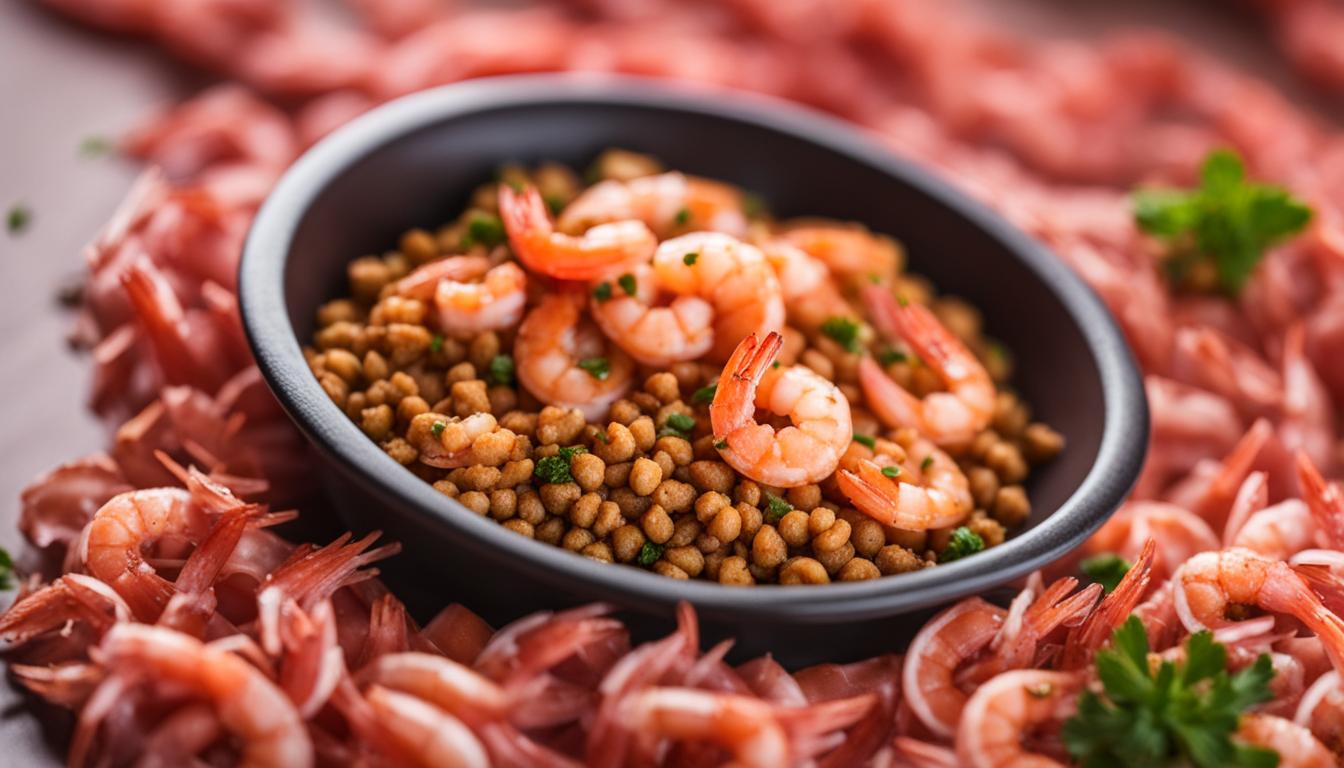Curious if your furry friend can indulge in some delicious shrimp? We’ve got the lowdown on whether shrimp is safe for dogs to eat and how it can fit into their diet. Let’s dive right in!
Shrimp can actually be a beneficial addition to your dog’s meals. They are low in fat, calories, and carbohydrates, making them a great choice for dogs who are watching their waistlines. However, it’s important to note that shrimp is high in cholesterol, so it should be given to your pup in moderation.
To ensure the safety of your dog, it is crucial to properly cook the shrimp and remove the shells. This will help prevent any potential choking hazards and ensure that your furry friend can enjoy their shrimp treat without any issues.
Key Takeaways:
- Shrimp can be a safe and nutritious addition to your dog’s diet when properly prepared.
- Shrimp is low in fat, calories, and carbohydrates, making it suitable for dogs on a diet.
- However, shrimp is high in cholesterol, so it should be given in moderation.
- When feeding your dog shrimp, ensure it is cooked and the shells are removed to avoid choking hazards.
- Consult with your veterinarian for personalized advice on incorporating shrimp into your dog’s diet.
The Nutritional Benefits of Shrimp for Dogs
Shrimp can be a fantastic addition to your dog’s diet, providing them with a variety of essential nutrients. Not only is shrimp low in fat, calories, and carbohydrates, but it also serves as a great source of high-quality protein for your furry friend. Protein is crucial for maintaining muscle mass, promoting healthy growth and development, and supporting the immune system.
In addition to being a protein powerhouse, shrimp contains vitamins that are beneficial for your dog’s overall health. Shrimp is particularly rich in vitamin B12, which plays a vital role in metabolism and gastrointestinal health. This vitamin is essential for your dog’s body to produce red blood cells and maintain a healthy nervous system. By incorporating shrimp into your dog’s diet, you can help ensure they receive an adequate amount of this important vitamin.
Another significant benefit of shrimp for dogs is its antioxidant content. Shrimp contains antioxidants that help combat free radicals in your dog’s body, reducing the risk of cellular damage and promoting overall well-being. These antioxidants can play a role in reducing brain aging, supporting cognitive function, and maintaining a healthy cardiovascular system.
The Nutritional Value of Shrimp for Dogs
| Nutrient | Amount per 3 oz (85g) of Cooked Shrimp |
|---|---|
| Protein | 18 grams |
| Vitamin B12 | 1.46 micrograms |
| Niacin | 2.2 milligrams |
| Antioxidants | Varying levels |
Note: Nutrient values may vary slightly depending on the source and cooking method.
While shrimp can be a fantastic addition to your dog’s diet, it’s essential to remember that moderation is key. It’s recommended to introduce shrimp gradually, observing your dog for any signs of allergies or digestive issues. Always consult with your veterinarian before making any significant changes to your dog’s diet, including the introduction of new foods like shrimp.

The Risks of Feeding Dogs Raw Shrimp
While shrimp can be a healthy addition to a dog’s diet when properly cooked, feeding them raw shrimp can pose several risks to your furry friend. Raw shrimp may contain harmful pathogens and bacteria that can lead to serious health issues in dogs.
One of the primary concerns with raw shrimp is the potential for shellfish poisoning. Raw shrimp can harbor bacteria such as Vibrio, which can cause gastrointestinal distress in dogs. Common symptoms of shellfish poisoning include diarrhea, vomiting, nausea, and abdominal pain.
Table: Potential Risks of Feeding Dogs Raw Shrimp
| Risks | Symptoms |
|---|---|
| Shellfish poisoning | Diarrhea, vomiting, nausea, abdominal pain |
| Bacterial infections | Diarrhea, vomiting, fever, lethargy |
In addition to shellfish poisoning, raw shrimp can also contain other bacteria such as Salmonella and E. coli, which can lead to bacterial infections in dogs. Symptoms of bacterial infections may include diarrhea, vomiting, fever, and lethargy. It is crucial to cook shrimp thoroughly before offering it to your dog to eliminate these potential health risks.
Protecting Your Dog from Raw Shrimp Risks
To ensure your dog’s safety, it is recommended to avoid feeding them raw shrimp altogether. Instead, opt for cooked shrimp that has been properly prepared. Cooking the shrimp not only eliminates the risks associated with raw seafood but also improves its digestibility for dogs.
When cooking shrimp for your dog, it’s essential to remove the shells and any tails. Shrimp shells can pose a choking hazard or cause blockages in your dog’s digestive system. By peeling and deveining the shrimp, you can minimize the risk of these potential complications.
Remember, always consult with your veterinarian before introducing any new food into your dog’s diet. They can provide personalized recommendations and guidance based on your dog’s specific needs and dietary restrictions.
How Much Shrimp Can Dogs Eat?
When it comes to feeding shrimp to your furry friend, moderation is key. Most dogs can safely consume one or two pieces of shrimp as an occasional treat. However, portion sizes may vary depending on the size and dietary needs of your dog. It is always best to consult with your veterinarian or a veterinary nutritionist for personalized advice on the proper quantities for your dog.
To give you a general idea, the table below provides an approximate guideline for portion sizes based on your dog’s weight:
| Dog’s Weight | Portion Size (shrimp) |
|---|---|
| Small (up to 20 lbs) | 1/4 to 1/2 piece |
| Medium (20 to 50 lbs) | 1/2 to 1 piece |
| Large (50 to 90 lbs) | 1 to 2 pieces |
| Extra Large (90+ lbs) | 2 to 3 pieces |
Remember, these are just general guidelines. It’s important to consider your dog’s overall diet and health condition when determining the appropriate portion size. Additionally, if your dog has any underlying health issues or special dietary requirements, it is crucial to consult with your veterinarian for specific recommendations.
By following these guidelines and consulting with your veterinarian, you can ensure that your dog enjoys shrimp in a safe and healthy manner.
Allergies and Shrimp: What Dog Owners Need to Know
While shrimp is generally safe for dogs to eat, it is important for dog owners to be aware of the possibility of allergies. While it is unlikely for dogs to be allergic to shrimp if they have never had it before, it is still possible for them to develop an intolerance or allergic reaction. If your dog has never tried shrimp before, it is best to introduce it gradually into their diet to monitor their response.

If your dog does have an allergic reaction to shrimp, the symptoms may include vomiting, diarrhea, itching, and swelling. It is important to pay attention to any signs of discomfort or distress in your dog after they consume shrimp. If you suspect that your dog is allergic to shrimp, it is best to consult with a veterinarian for further guidance and potential testing to confirm the allergy.
Remember, every dog is different, and while some may enjoy shrimp without any issues, others may have adverse reactions. As a responsible dog owner, it is important to prioritize your dog’s health and well-being by being observant and responsive to their needs. If shrimp does not agree with your dog, there are plenty of other seafood options that can provide similar nutritional benefits.
Other Seafood Options for Dogs
While shrimp can be a delicious and nutritious seafood option for dogs, there are also other types of seafood that can be safely incorporated into their diet. These alternatives provide a variety of vitamins, minerals, and other essential nutrients that can contribute to a healthy canine lifestyle.
Mussels: These shellfish are not only rich in protein but also contain beneficial nutrients such as omega-3 fatty acids, iron, and vitamin B12. Mussels can support healthy joints and promote a shiny coat for your furry friend.
Oysters: Oysters are an excellent source of zinc, which is important for immune function and skin health in dogs. They also provide high-quality protein and essential vitamins like vitamin D.
Wild Salmon: This fatty fish is a fantastic source of omega-3 fatty acids, which can support heart health, reduce inflammation, and promote a healthy coat and skin in dogs. However, it is crucial to choose wild-caught salmon as opposed to farm-raised to ensure the best nutritional quality.
| Seafood Option | Nutritional Benefits |
|---|---|
| Mussels | Rich in protein, omega-3 fatty acids, iron, and vitamin B12 |
| Oysters | High in zinc, protein, and vitamin D |
| Wild Salmon | Excellent source of omega-3 fatty acids for heart health and a shiny coat |
Sardines: These small oily fish are packed with omega-3 fatty acids and are a great source of protein and vitamin D. Sardines can promote healthy skin and coat, support brain development, and aid in joint mobility.
Crab: Crabs are a good source of lean protein, zinc, selenium, and B vitamins. They can provide dogs with essential nutrients and contribute to a well-rounded diet.
Lobster: De-shelled lobster meat can be a special treat for dogs, as it offers protein, omega-3 fatty acids, and vitamins. However, it is crucial to remove the shell and any seasoning before serving it to your furry friend.
When introducing any new food to your dog’s diet, it is important to monitor them for any adverse reactions or allergies. If you notice any unusual symptoms, consult with your veterinarian for guidance.
Remember, variety is key when it comes to providing a balanced and nutritious diet for your dog. By incorporating different types of seafood, such as mussels, oysters, wild salmon, sardines, crab, and lobster, you can ensure that your canine companion receives a range of essential nutrients and enjoys a flavorful meal.

Conclusion
So, can dogs eat shrimp? Absolutely! As long as it’s cooked, the shells are removed, and you feed it in moderation, shrimp can be a nutritious addition to your dog’s diet. Not only is shrimp low in fat and calories, but it’s also packed with beneficial nutrients like vitamins, minerals, antioxidants, and omega-3 fatty acids.
If you’re feeling creative in the kitchen, you can even make homemade shrimp dog treats! Whip up a batch using cooked shrimp, incorporating it with dog-safe ingredients like rice for a flavorful and healthy snack that your pup will surely love.
Remember, it’s always a good idea to consult with your veterinarian before introducing any new food to your dog’s diet, including shrimp. They can provide personalized advice based on your dog’s specific needs and dietary requirements.
So go ahead, grab that pot and start cooking up some delicious shrimp for your furry friend. With proper preparation and portion control, you can treat your dog to the savory goodness of shrimp while ensuring their well-being and happiness. Bon appétit!
FAQ
Can dogs eat shrimp?
Yes, dogs can eat shrimp. However, it is important to cook the shrimp properly and remove the shells to avoid any choking hazards.
Are shrimp nutritionally beneficial for dogs?
Yes, shrimp are packed with essential nutrients that dogs need. They are a good source of vitamin B12, niacin, and antioxidants, which can benefit metabolism, energy production, gastrointestinal health, and brain aging.
Can dogs eat raw shrimp?
No, dogs should not be fed raw shrimp due to the potential presence of harmful pathogens and bacteria. Raw shrimp can cause shellfish poisoning and lead to symptoms such as diarrhea, vomiting, nausea, and abdominal pain in dogs.
How much shrimp can dogs eat?
Most dogs can safely consume one or two pieces of shrimp as an occasional treat. It is recommended to offer a partial piece of shrimp to small dogs as a precaution. Consult with your veterinarian for personalized advice on proper quantities for your dog.
Can dogs be allergic to shrimp?
While it is unlikely for dogs to be allergic to shrimp if they have never had it before, it is still possible for them to develop an intolerance or allergic reaction. Symptoms may include vomiting, diarrhea, itching, and swelling. Introduce shrimp gradually and monitor for signs of an allergic reaction.
Are there other seafood options for dogs?
Yes, mussels, oysters, wild salmon, sardines, crab, and lobster (de-shelled) are other seafood options that can provide nutritional benefits to dogs, including protein, omega-3 fatty acids, vitamins, and minerals.





